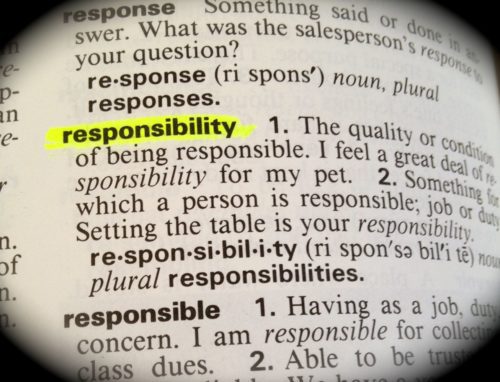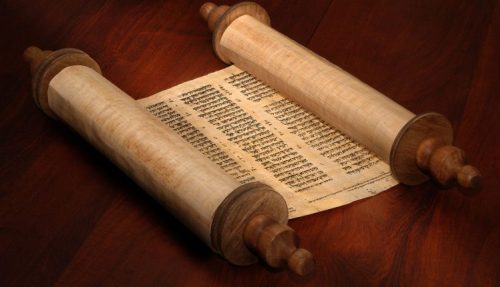
The parsha of Noach brings to a close the eleven chapters that precede the call to Abraham and the beginning of the special relationship between him and his descendants, and God. During these eleven chapters, the Torah gives prominence to four stories: Adam and Eve, Cain and Abel, Noah and the generation of the Flood, and the Tower of Babel. Each of these stories involves an interaction between God and humanity. Each represents another step in the maturation of humanity. If we trace the course of these stories, we can discover a connection that goes deeper than chronology, a developmental line in the narrative of the evolution of humanity.
The first story is about Adam and Eve and the forbidden fruit. Once they have eaten, and discovered shame, God asks them what they have done:
And He said, “Who told you that you were naked? Have you eaten from the tree that I commanded you not to eat from?”
The man said, “The woman You put here with me – she gave me some fruit from the tree, and I ate it.”
Then the Lord God said to the woman, “What is this you have done?”
The woman said, “The serpent deceived me, and I ate.” (3:11 –13)
Faced with primal failure, the man blames the woman, the woman blames the serpent. Both deny personal responsibility: it wasn’t me; it wasn’t my fault. This is the birth of what today is called the victim culture.
The second drama is about Cain and Abel. Both bring offerings. Abel’s is accepted, Cain’s is not – why this is so is not relevant here.[1] In his anger, Cain kills Abel. Again there is an exchange between a human being and God:
Then the Lord said to Cain, “Where is your brother Abel?”
“I don’t know,” he replied. “Am I my brother’s keeper?”
The Lord said, “What have you done? Listen! Your brother’s blood cries out to Me from the ground (49:9-10).
Once again the theme is responsibility, but in a different sense. Cain does not deny personal responsibility. He does not say, “It wasn’t me.” He denies moral responsibility. “I am not my brother’s keeper.” I am not responsible for his safety. Yes, I did it because I felt like it. Cain has not yet learned the difference between “I can” and “I may.”
The third is the story of Noah. Noah is introduced with great expectations: “He will comfort us” (5:29), says his father Lamech, giving him his name. This is the one to redeem man’s failure, to offer comfort for “the earth which God cursed.” Yet though Noah is a righteous man, he is not a hero. Noah does not save humanity. He saves only himself, his family and the animals he takes with him in the ark. The Zohar contrasts him unfavourably with Moses: Moses prayed for his generation, Noah did not. In the end, his failure to take responsibility for others diminishes him as well: in the last scene we see him drunk and exposed in his tent. In the words of the Midrash, “he profaned himself and became profaned.”[2] One cannot be a sole survivor and still survive. Sauve-qui- peut (“let everyone who can, save himself”) is not a principle of Judaism. We have to do what we can to save others, not just ourselves. Noah failed the test of collective responsibility.
The fourth is the enigmatic story of the Tower of Babel. The sin of its builders is unclear, but is indicated by two key words in the text. The story is framed, beginning and end, with the phrase kol ha’aretz, “the whole earth” (11:1, 8). In between, there is a series of similar sounding words: sham (there), shem (name), and shamayim (heaven). The story of Babel is a drama about the two key words of the first sentence of the Torah: “In the beginning God created heaven (shamayim) and earth (aretz)” (1:1). Heaven is the domain of God; earth is the domain of man. By attempting to build a tower that would “reach heaven,” the builders of Babel were men trying to be like gods.
This story seems to have little to do with responsibility, and to be focusing on a different issue than do the first three. However, not accidentally does the word responsibility suggest response-ability. The Hebrew equivalent, ah?rayut, comes from the word ah?er, meaning “an other.” Responsibility is always a response to something or someone. In Judaism, it means response to the command of God. By attempting to reach heaven, the builders of Babel were in effect saying: we are going to take the place of God. We are not going to respond to His law or respect His boundaries, not going to accept His Otherness. We are going to create an environment where we rule, not Him, where the Other is replaced by Self. Babel is the failure of ontological responsibility – the idea that something beyond us makes a call on us.
What we see in Genesis 1–11 is an exceptionally tightly constructed four-act drama on the theme of responsibility and moral development, presenting the maturation of humanity, as echoing the maturation of the individual. The first thing we learn as children is that our acts are under our control (personal responsibility). The next is that not everything we can do, we may do (moral responsibility). The next stage is the realisation that we have a duty not just to ourselves but to those on whom we have an influence (collective responsibility). Ultimately we learn that morality is not a mere human convention, but is written into the structure of existence. There is an Author of being, therefore there is an Authority beyond mankind to whom, when acting morally, we respond (ontological responsibility).
This is developmental psychology as we have come to know it through the work of Jean Piaget, Eric Erikson, Lawrence Kohlberg and Abraham Maslow. The subtlety and depth of the Torah is remarkable. It was the first, and is still the greatest, text on the human condition and our psychological growth from instinct to conscience, from “dust of the earth” to the morally responsible agent the Torah calls “the image of God.”
Shabbat Shalom,
[1] For more on Cain and Abel, see the essay “Violence in the Name of God”, Covenant and Conversation: Genesis, p29.
An international religious leader, philosopher, award-winning author and respected moral voice, Rabbi Lord Jonathan Sacks was awarded the 2016 Templeton Prize in recognition of his “exceptional contributions to affirming life’s spiritual dimension.” Described by H.R.H. The Prince of Wales as “a light unto this nation” and by former British Prime Minister Tony Blair as “an intellectual giant”, Rabbi Sacks is a frequent and sought-after contributor to radio, television and the press both in Britain and around the world.
Since stepping down as the Chief Rabbi of the United Hebrew Congregations of the Commonwealth – a position he served for 22 years between 1991 and 2013 – Rabbi Sacks has held a number of professorships at several academic institutions including Yeshiva University and King’s College London. In addition to his writing and lecturing, he currently serves as the Ingeborg and Ira Rennert Global Distinguished Professor at New York University. Rabbi Sacks has been awarded 17 honorary doctorates including a Doctor of Divinity conferred to mark his first ten years in office as Chief Rabbi, by the then Archbishop of Canterbury, Lord Carey.
Rabbi Sacks is the author of over 30 books. Among them, Rabbi Sacks has published a new English translation and commentary for the Koren Sacks Siddur, the first new Orthodox siddur in a generation, as well as powerful commentaries for the Rosh HaShana, Yom Kippur, Pesach, Shavuot and Sukkot Machzorim. His most recent work, Not in God’s Name: Confronting Religious Violence was awarded a 2015 National Jewish Book Award in America and was a top ten Sunday Times bestseller in the UK. Past works include: The Great Partnership: God, Science and the Search for Meaning; The Dignity of Difference: How to Avoid the Clash of Civilizations, winner of the Grawemeyer Prize for Religion in 2004 for its success in defining a framework for interfaith dialogue between people of all faith and of none; To Heal a Fractured World: The Ethics of Responsibility; and A Letter in the Scroll: On Being Jewish, winner of a National Jewish Book Awards in 2000. His Covenant & Conversationcommentaries on the weekly Torah portion are read in Jewish communities around the world.
In recognition of his work, Rabbi Sacks has received, among others, the Jerusalem Prize in 1995 for his contribution to diaspora Jewish life, The Ladislaus Laszt Ecumenical and Social Concern Award from Ben Gurion University in Israel in 2011, The Guardian of Zion Award from the Ingeborg Rennert Center for Jerusalem Studies at Bar-Ilan University in 2014, and The Katz Award in recognition of his contribution to the practical analysis and application of Halakha in modern life in Israel in 2014. He was named as The Becket Fund’s 2014 Canterbury Medalist for his role in the defence of religious liberty in the public square; won a Bradley Prize in 2016 in recognition of being “a leading moral voice in today’s world”; and in 2017, he was awarded the Irving Kristol Award from the American Enterprise Institute for his “remarkable contributions to philosophy, religion, and interfaith discourse… as one of the world’s greatest living public intellectuals.” In 2018, he was given the Lifetime Achievement Award by The London Jewish News in recognition of his services to the Jewish world and wider society.
Rabbi Sacks was knighted by Her Majesty The Queen in 2005 and made a Life Peer, taking his seat in the House of Lords in October 2009. Born in 1948 in London, he has been married to Elaine since 1970. They have three children and several grandchildren.
